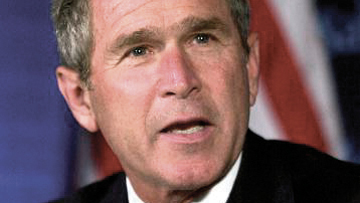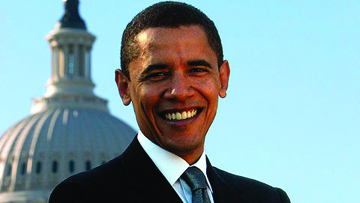You have free articles remaining this month.
Subscribe to the RP Witness for full access to new articles and the complete archives.
Many year-end lists are putting the election of the first African-American president of the United States as the news story of the year. Indeed, the election of Barack Obama as president was a defining moment for the United States, and for the world. But what, precisely, did his election define? We will take a look at some of the defining moments of 2008.
Obama Nation, or Abomination?
When 2008 began, many polls showed Mitt Romney and Hillary Clinton as the frontrunners in the presidential sweepstakes. But with support from evangelicals and born-again Christians, an estimated 60 percent of Republican caucus goers, former Arkansas Gov. Mike Huckabee swept to a clear victory on the GOP side of Iowa’s first-in-the-nation presidential primary on Jan. 3.
Also in Iowa, America got its first look at the Obama mania that came to be called the “Obama Nation.” Obama pulled in 37 percent of caucus voters, which gave him a surprisingly comfortable lead over John Edwards and Hillary Clinton in a race that just 24 hours before the election was too close to call.
We know the rest of the story. Obama went on to a convincing win in November over the eventual Republican nominee, John McCain. But along the way, some critics came to call the “Obama Nation” an abomination because of Obama’s support for abortion, civil unions between gay couples, and other policy positions that many Christians find repugnant.
How Obama will actually govern on these issues, and whether it will be materially different from a Republican president that allowed $300 million in government money to go to Planned Parenthood, the nation’s largest abortion provider, remains to be seen. (See article, “2008 Milestones and Benchmarks”.)
California Passes Prop 8
While Republicans may have taken a beating on Nov. 4, conservative values did not. One of the most defining of “defining moments” in 2008 was the decision of voters to once again define marriage as the union of one man and one woman.
On election day, Florida, Arizona, and California became the 28th, 29th, and 30th states to amend their constitutions to state explicitly that very definition.
“It’s going to be important as we talk about this election, and make it very clear, it’s not a rejection of conservative values,” said Tony Perkins, president of FRC Action in Washington, D.C. “Politicians must make a more sincere effort to protect marriage if they want the support of values voters.” Perkins’ message is backed up by the numbers, with passage in Arizona garnering 56 percent, Florida with 62 percent and California with 52 percent.
Conservative Episcopalians Unite
A defining moment took place in the worldwide Anglican church this year when on Dec. 3 conservative American groups, some of which had broken away from the Episcopal Church 100 years ago, came together to form a new church body with more than 100,000 members.
The Episcopal Church now has many fewer than one million regular churchgoers. Even though the church has been the spiritual home of more presidents than any other, its decline into irrelevance has caused many evangelicals to wonder what the fuss is all about. But Bishop Martyn Minns, one of the leaders of the new group, to be called the Anglican Church of North America, says evangelicals in all denominations should be paying close attention. “What is happening in the Episcopal Church is happening in all denominations,” he said. “All churches are, at all times, either in renewal or in decline. And just as the Episcopal Church led the mainline churches on the way down, so this new expression of Anglicanism could lead a robust, orthodox, evangelical Christianity to new prominence in American life.”
Grassley Ratchets Up the Pressure
In 2007, Sen. Charles Grassley fired a shot across the bow of parachurch and nonprofit movement—which is now almost one million organizations strong and now has tens of billions of dollars at its disposal. That shot was a call for financial records from six television ministries who have a combined total of almost $1 billion in income.
The Grassley statement took a shot at the lawyers representing the noncompliant ministries: “These attorneys who aren’t part of the ministries themselves have a natural incentive to prolong the process as long as possible.” And they have so far prolonged the investigation at least till year-end. That may be good news for the ministries, but sources close to Sen. Grassley tell EP News that the delaying tactics have given Grassley time to build a stronger case against these organizations, and to formulate new regulations that could change the entire nonprofit landscape. The regulations will require greater levels of financial disclosure and tougher penalties for noncompliance.
These developments, if they come to pass, will have a huge impact on the evangelical movement, much of which is in fact a network of parachurch ministries operating as 501(c)3 or similar organizations. “There hasn’t been significant financial reform in the nonprofit sector since the 1960s,” said Rusty Leonard, of the watchdog group MinistryWatch.com “But it’s coming, and to fight it, rather than to be a part of helping to shape it, will end up serving neither individual organizations nor the evangelical movement as a whole.”
America Around The World
One of the themes of Barack Obama’s campaign was that America was not loved and respected around the world, and that he would restore America’s prestige.
But don’t tell that to the nations of Africa, who have been the beneficiary of more than $15 billion in aid during the Bush years, mostly to fight AIDS. In a six-day, five-nation trip to Africa this year, President Bush highlighted the fact that more than half of the health care delivery system in Africa is faith-based.
“There’s one institution in every village in Africa, and that’s the church,” explained Jay Hein, director of White House Faith Based and Community Initiatives. “There isn’t always a school, there isn’t always a health clinic, there isn’t always a police department, but they virtually always have a faith institution.”
Ray Martin of Christian Connections for International Health said Christians cannot afford to become complacent. ”We are making progress, but that doesn’t suggest that we’ve licked the challenge of AIDS,” Martin said.
No need to worry; Americans are not becoming complacent. Among the stories the mainstream media under-reported this year: Americans are the most generous people on earth. According to Arthur Brooks, a philanthropy expert, no other nation on earth comes even close to matching the generosity of Americans when it comes to both foreign aid and personal philanthropy. The reason Americans are so generous? “Conservative Christians,” Brooks said. “Across all ethnic, racial, and class segments, the only characteristic that correlates to giving is religious faith, and conservative Christians are more than three times as generous as liberal Christians.”
Evangelical Disarray And Realignment
This was an interesting year for that loose and informal affiliation of Christians sometimes called the “evangelical church.” For one thing, no one quite knows what that means. The evangelical church has a proxy in many mainstream news stories: the National Association of Evangelicals (NAE). This year was a defining moment for the NAE as well, as it attempted to clarify what it stood for.
Others are just beginning to hear of it. In November 2007, NAE President Leith Anderson and NAE Vice President Richard Cizik signed onto a Christian response to an invitation to dialogue from 138 Muslim leaders around the world. The document apologized for the sins of Christians during the Crusades and for excesses of the global war on terror, without mentioning Muslim atrocities. It appeared to leave the fundamentals of Christianity—especially the deity of Christ—open for discussion. Anderson and Cizik were roundly criticized by leaders from throughout the evangelical world. Dr. Al Mohler, a Southern Baptist leader, said the agreement “sends the wrong signal” and contains basic theological problems, especially in marginalizing Jesus Christ. He also condemned the apology for the Crusades. “I just have to wonder how intellectually honest this is,” he said. “Are these people suggesting that they wish the military conflict with Islam had ended differently — that Islam had conquered Europe?”
This was just one gaffe of many for Cizik. He had been an outspoken critic of Republican policies related to environmentalism, which had not been approved as a “core issue” for the NAE. And finally, in an interview with National Public Radio’s program “Fresh Air,” he suggested that same-sex marriage, or at least civil unions, might be appropriate. It was too much for the people who signed his paycheck, and Cizik resigned from the NAE in December.
Upheaval at the NAE was, however, just a symptom of a lack of unity among evangelicals. While most evangelicals supported Mike Huckabee in the primaries, most evangelical leaders would not endorse him, causing his candidacy to get a slow start. Some evangelical leaders—including Salem Radio’s Stuart Epperson, Lou Sheldon of the Traditional Values Coalition, and evangelical scholar Wayne Grudem—supported Mitt Romney, despite Romney’s Mormonism. Emblematic of evangelical indecision and angst was the behavior or Dr. James Dobson of Focus on the Family. He said he could not “under any circumstances” support John McCain. But he did not endorse Mike Huckabee until a week before Huckabee dropped out of the race. Then he turned his support to McCain. “I have not endorsed him,” Dobson said, “but…I have concluded for the first time that I might. If that is a flip-flop, then so be it.” Later, he said, “I made a mistake.” Among evangelicals, on that point anyway, there was widespread agreement.
But as Dobson’s star seemed to be setting, another evangelical leader seemed to be on the rise. On Aug. 16, the Rev. Rick Warren, author of bestseller The Purpose-Driven Life, hosted Sen. Barrack Obama and Sen. John McCain at Saddleback Church in Lake Forest, Calif. This joint appearance of the candidates was part of The Saddleback Civil Forum series focusing on compassion and leadership. It was broadcast live on C-Span and elevated Warren’s stature in the eyes of the mainstream media as the “go-to guy” among evangelicals.
Media and Religion
For years, the mainstream media have insisted that evangelicals are split in two—those who focus on marriage and the sanctity of human life, and those who fight global warming and poverty. Not so, says Pastor Rick Warren of Saddleback Church, author of The Purpose-Driven Life. He told the Wall Street Journal there’s been a misunderstanding by the media. “A lot of people hear (about a broader agenda) and they think, ‘Oh, evangelicals are giving up on believing that life begins at conception.’ They’re not giving up on that at all.” Though the media seem to crave a good fight, Warren was unable to name any theological issues on which he and Dr. James Dobson disagree. In the interview, he recalled that tolerance used to be the idea that you “treat others with respect.” Now, he lamented, it has come to mean “all ideas are equally valid.”
Religion played a much more significant role in the media coverage of President-elect Barack Obama than it did in the press treatment of Republican nominee John McCain during the 2008 presidential campaign, but much of the coverage related to the false rumors that Obama is a Muslim. Meanwhile, there was little attempt by the news media during the campaign to comprehensively examine the role of faith in the political values and policies of the candidates, save for those of Republican vice presidential nominee Sarah Palin. That’s according to a Pew poll released just after the election. And when religion-focused campaign stories were covered by the mainstream press, often the context was negative, controversial or focused on a perceived political problem.
—Warren Cole Smith
Warren Smith is director of EP News, which is affiliated with the Evangelical Press Association (EPA). The Witness is a publication member of EPA.

